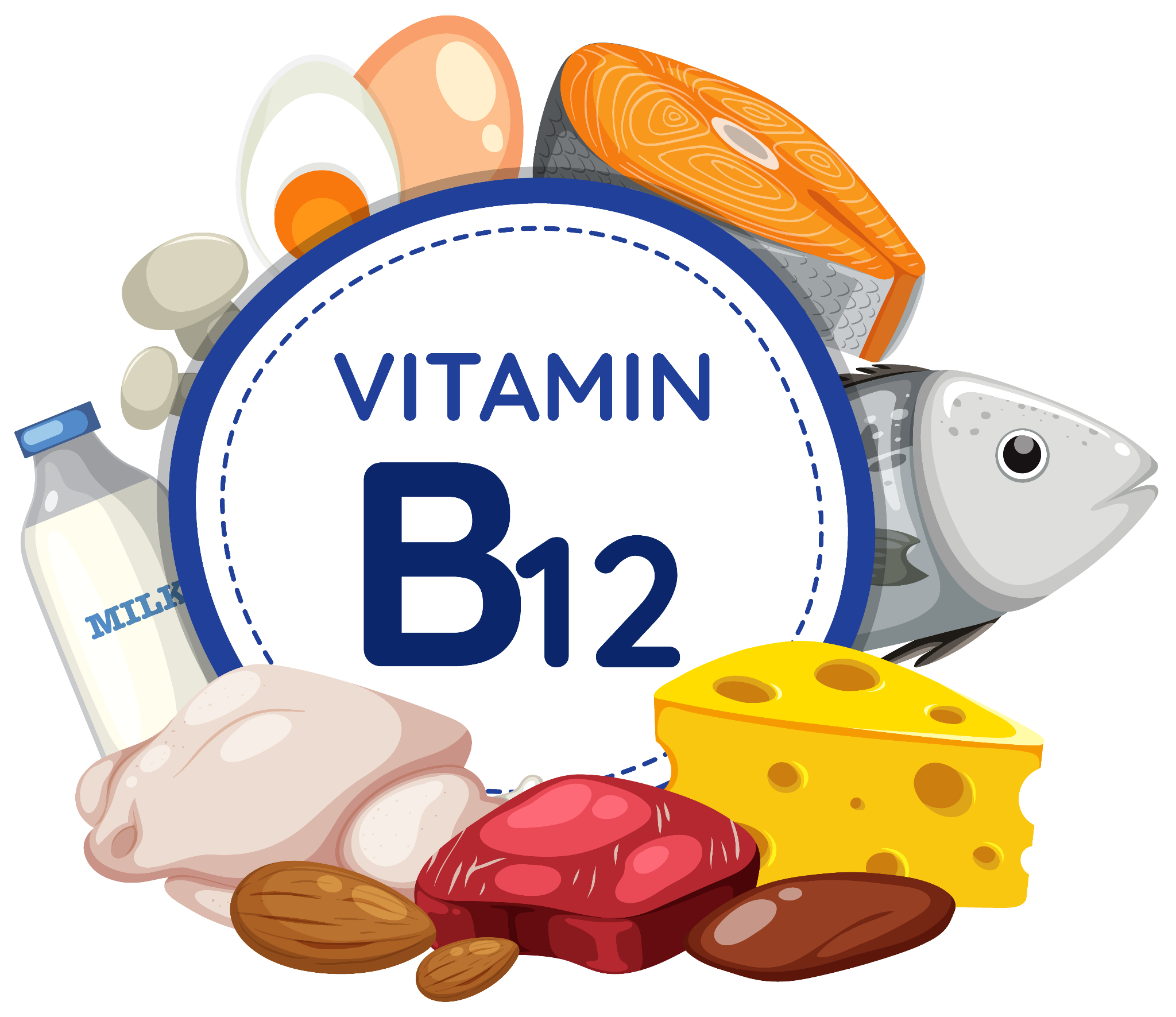
Foods rich in Vitamin B12 such as fish, eggs, and dairy, highlighting sources that support nerve and energy health.
People forget how important it is to eat a balanced diet because they are always busy and eating junk food. Many people don't know how important vitamin B12 is. It helps the body use energy, makes red blood cells, and keeps nerves healthy.
You might not know it, but not getting enough of this important vitamin could hurt your body. It can make you tired, change your mood, hurt your nerves, and put your health at risk for a long time. More and more people are going to Prakash Hospitals with vague symptoms like tiredness, forgetfulness, or tingling. It turned out that these were all signs of a lack of Vitamin B12. If you catch it early and deal with it, you can stop it from getting worse and make your life a lot better.
Cobalamin, also known as vitamin B12, is a water-soluble vitamin that is very important for many functions in the body:
Humans cannot make B12 naturally, so they need to eat foods that contain it, like meat, eggs, dairy products, and fortified foods.
People who are vegans, older, or have certain digestive problems are more likely to not get enough.
There are several reasons someone might not get enough vitamin B12:
Dietary Deficiency:
Some strict vegans or individuals who don’t eat much animal-based food may not get enough B12.
Malabsorption Issues:
Diseases such as pernicious anemia, celiac disease, Crohn’s disease, and chronic gastritis can impair B12 absorption.
Medications:
Long-term use of proton pump inhibitors, metformin, or antacids may interfere with B12 absorption.
Age-Related Factors:
Older adults often produce less stomach acid, which is necessary to release B12 from food.
Surgical History:
Surgeries affecting the stomach or intestines, such as gastric bypass, can reduce the body’s ability to absorb B12.
Vitamin B12 deficiency usually develops slowly, and early symptoms are not always obvious:
Many people mistake these symptoms for normal aging, stress, or minor health problems, which can delay diagnosis and treatment.
Vitamin B12 is necessary for forming the myelin sheath, which protects nerves and ensures proper signal transmission.
Chronic deficiency may lead to:
Peripheral Neuropathy: Tingling, numbness, or burning sensations in the hands and feet.
Gait Problems: Difficulty walking, poor balance, and impaired coordination.
Cognitive Decline: Memory issues, lack of focus, or confusion.
Mood Disorders: Anxiety, irritability, or depression due to impaired neurotransmitter synthesis.
If left untreated, these neurological symptoms may become permanent, highlighting the importance of early detection.
Vitamin B12 is essential for red blood cell production.
Deficiency can cause megaloblastic anemia, characterized by:
Untreated anemia increases cardiovascular strain, especially in older adults or those with pre-existing heart conditions.
Vitamin B12 deficiency can also affect digestion:
These symptoms often overlap with other gastrointestinal disorders, making clinical evaluation necessary for an accurate diagnosis.
Certain groups are more susceptible to B12 deficiency:
Awareness of risk factors helps with early detection and preventive care.
Diagnosis requires a combination of physical examination and laboratory tests:
A medical professional taking a blood sample.
Neurological Assessment:
Additional Tests:
At Prakash Hospitals, neurologists, hematologists, and gastroenterologists collaborate to ensure a thorough evaluation and accurate diagnosis.
Treatment depends on severity and cause:
Dietary Intake:
Oral or Sublingual Supplements:
Intramuscular or Subcutaneous Injections:
Addressing Underlying Conditions:
Monitoring and Follow-Up:
Most patients notice improvements in mood, energy, and brain function within a few weeks of starting treatment.
Preventive measures can reduce the risk of deficiency:
Maintain a balanced diet with adequate B12 intake
Consider supplements if you are a strict vegan
Take care of digestive health proactively
Monitor B12 levels in older adults regularly
Consult your doctor about medications that may reduce B12 absorption
Untreated Vitamin B12 deficiency can lead to:
Permanent nerve damage
Irreversible cognitive decline
Chronic anemia and cardiovascular strain
Mood disorders and depression

A woman with low energy levels due to Vitamin B12 deficiency,
At Prakash Hospitals, we provide comprehensive care for Vitamin B12 deficiency:
Hematology Consultation: For anemia evaluation and supplementation
Neurology Assessment: For nerve and brain health
Nutrition Counseling: Personalized meal plans and supplement guidance
Gastroenterology Review: Identify and manage absorption issues
Follow-Up Care: Monitor response and adjust treatment as needed
This integrated approach ensures patients receive complete, multidisciplinary care.
Seek medical attention if you experience:
Early evaluation can prevent severe complications and restore overall health.
Vitamin B12 is essential for maintaining healthy blood, nerves, and energy levels. At first, deficiency may seem minor, but over time it can lead to serious health problems. With early diagnosis, proper treatment, and lifestyle modifications, most patients can fully recover and regain vitality.
At Prakash Hospitals, our integrated care model ensures thorough evaluation, accurate diagnosis, and effective treatment for Vitamin B12 deficiency. Don’t ignore fatigue, numbness, or mood changes—they could be signs your body needs attention. Proper nutrition and timely medical care can help restore your health and energy.
We offer expert care across key specialties, including Medicine, Cardiology, Orthopaedics, ENT, Gynaecology, and more—delivering trusted treatment under one roof.
Prakash Hospital Pvt. Ltd. is a 100 bedded NABH NABL accredited multispecialty hospital along with a center of trauma and orthopedics. We are in the service of society since 2001.
OUR SPECIALITIES
Contact Us
D – 12A, 12B, Sector-33, G. B. Nagar, Noida, Uttar Pradesh 201301
+91-8826000033

© 2026 All rights reserved.
Designed and Developed by Zarle Infotech